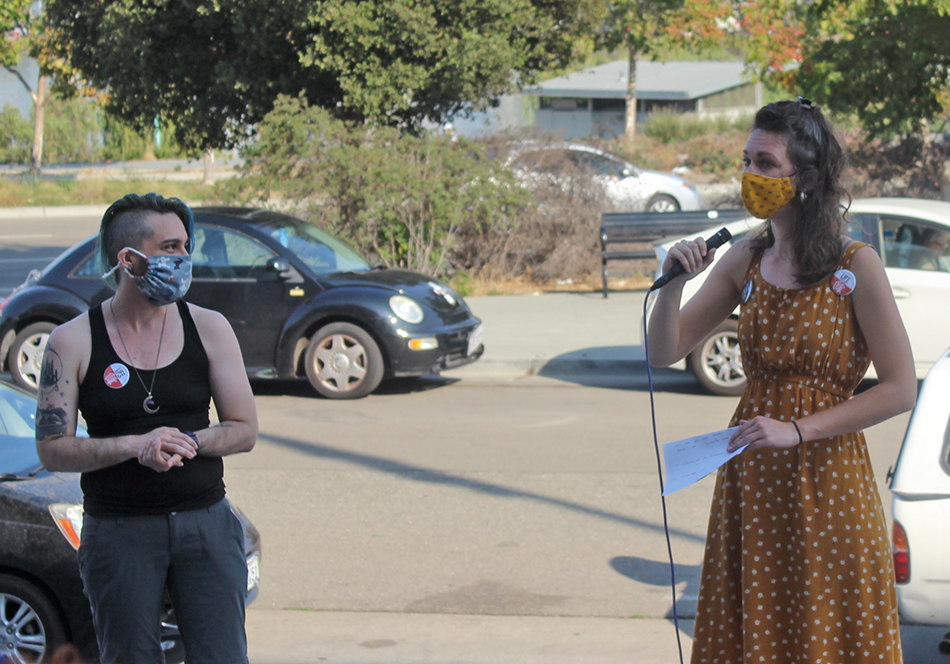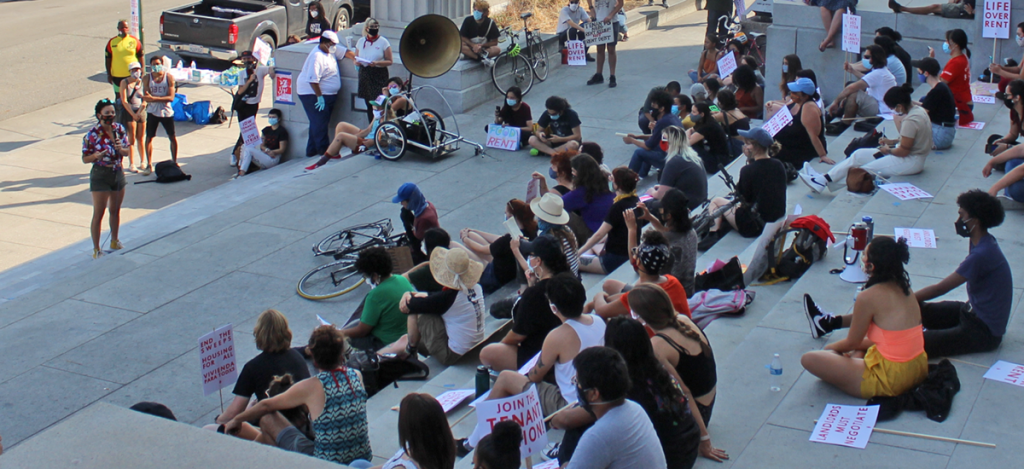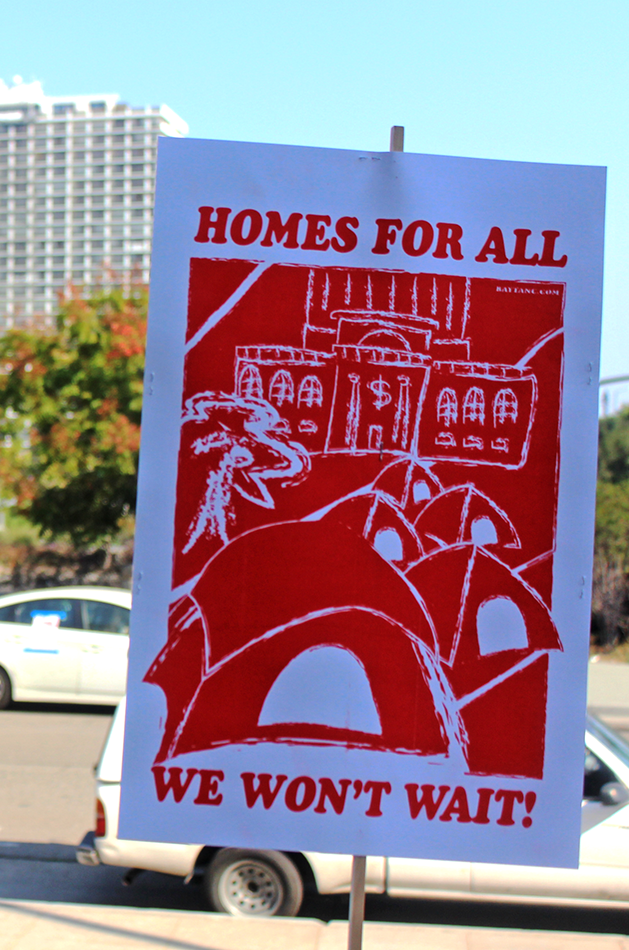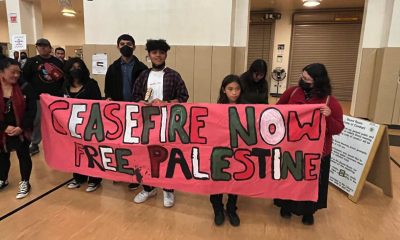Activism
‘Life Over Rent’ Rally Speakers Urge Tenants to Organize, Prepare next Steps

About 175 tenants gathered on the steps of Alameda County’s Superior Courthouse for a rally called Life Over Rent/Nuestrxs Vidas Si Renta No last Saturday.
A Facebook invitation for the rally claimed “Our needs come before our landlord’s profits” and showed that five different tenants’ unions organized the event: Tenants and Neighborhood Councils (TANC), SMC Tenants Council, Lonay Tenants Council, Village Residents Association at UC Berkeley Family Housing and JDW Tenants Union.

Jourdan Sales (far left) of JDW Tenants Union speaking to tenants at the Life Over Rent / Nuestrxs Vidas Si Renta No rally in front of the Alameda County Courthouse on September 5. Photo by Zack Haber
The invite also listed three goals: canceling rent during the pandemic, recognition and negotiation from landlords of collectively organized tenants, and prohibiting all evictions and expanding unemployment and food stamps for those hit hardest by the pandemic.
Although the day was hot with temperatures in the upper 80s and 90s, the courthouse provided shade where tenants sat in as they listened to about a dozen speakers representing different local grassroots tenant, labor, and housing justice groups.
A march was planned, but it was canceled as smoke increasingly blew into the area. Tenants held signs, mostly in red, some of which read “EVICTIONS = POLICE VIOLENCE,” “BLACK LIVES MATTER, BLACK TENANTS MATTER,” “HOMES FOR ALL, WE WON’T WAIT” and “LANDLORDS MUST NEGOTIATE.”

Photo by Zack Haber
Gerald Smith, a former Black Panther who’s currently a member of the Oscar Grant Organizing Committee spoke first and encouraged people to join in the fight to release people from San Quentin State Prison, where currently 26 people have died from COVID-19. Then Smith spoke of lessons he learned participating in The Harlem Rent Strikes in the mid-1960s and highlighted the importance of organized leadership and planning beyond small wins against landlords. After some landlords abandoned buildings during the Harlem strike, Smith said many renters weren’t organized or prepared on how to respond.
“We figured if you beat them, things are going to be all right,” Smith said. “But it’s not going to be all right. As long as capitalism exists it’s not going to be all right. You have to prepare people for the next step.”
Judy Greenspan, a local teacher and member of the Oakland Education Association spoke next and pointed out that COVID-19 could cause massive privatization of schools in addition to evictions if people do not organize well.
ILWU Local 34 president Keith Shanklin spoke against the Howard Terminal Project, which plans to place an Oakland A’s ballpark and market-rate condos in The Port of Oakland, and said it would destroy union longshoreman jobs.
Members of several local tenants’ unions including JDW Tenants Union, SMC Tenants Council and Alice Street Dunsmuir Tenant Union spoke of the need to connect and organize with other tenants, particularly ones who rent from the same landlord.
Jourdan Sales of JDW Tenants Union said her landlord, Justin Douglas Wallway, found a loophole he tried to use to remove rent control from more than 30 of the households he rented to in 2017. But through tenants organizing and collaborating with Centro Legal De La Raza, they were able to close the loophole.
“We actually changed housing legislation,” they said. “This battle took two years before it was won. This isn’t something that’s going to happen overnight. These things that we want to take time.”
Kieryn Darkwater and Casey Busher of Alice Street Dunsmuir Tenant Union spoke of how they have fought to stop their landlord from charging them for utilities they claim they are not legally obligated to pay. As their fight has been hung up in the Rent Adjustment Program and court, they have expanded and worked with the Ivy Hills Tenant Union.
Their landlord has refused to negotiate with them. Together, both groups have 25 units currently on rent strike. They’ve also started meeting regularly and have a bulletin board in their shared laundry room where they lend out tools and help each other with pet sitting.
“We have become our landlord’s worst nightmare,” said Darkwater.
Dayton Andrews of The United Front Against Displacement spoke of unifying unhoused and housed people together, dismantling distinctions between different struggles including housing, immigration, and queer rights.
“We have to come together as a class to oppose the enemies of the people,” said Andrews.
Activism
Gov. Newsom Approves $170 Million to Fast Track Wildfire Resilience
AB 100 approves major investments in regional conservancies across the state, including over $30 million each for the Sierra Nevada, Santa Monica Mountains, State Coastal, and San Gabriel/Lower LA Rivers and Mountains conservancies. An additional $10 million will support wildfire response and resilience efforts.

By Bo Tefu
California Black Media
With wildfire season approaching, last week Gov. Gavin Newsom signed Assembly Bill (AB) 100, unlocking $170 million to fast-track wildfire prevention and forest management projects — many of which directly protect communities of color, who are often hardest hit by climate-driven disasters.
“With this latest round of funding, we’re continuing to increase the speed and size of forest and vegetation management essential to protecting communities,” said Newsom when he announced the funding on April 14.
“We are leaving no stone unturned — including cutting red tape — in our mission to ensure our neighborhoods are protected from destructive wildfires,” he said.
AB 100 approves major investments in regional conservancies across the state, including over $30 million each for the Sierra Nevada, Santa Monica Mountains, State Coastal, and San Gabriel/Lower LA Rivers and Mountains conservancies. An additional $10 million will support wildfire response and resilience efforts.
Newsom also signed an executive order suspending certain regulations to allow urgent work to move forward faster.
This funding builds on California’s broader Wildfire and Forest Resilience Action Plan, a $2.7 billion effort to reduce fuel loads, increase prescribed burning, and harden communities. The state has also launched new dashboards to keep the public informed and hold agencies accountable.
California has also committed to continue investing $200 million annually through 2028 to expand this effort, ensuring long-term resilience, particularly in vulnerable communities.
Activism
California Rideshare Drivers and Supporters Step Up Push to Unionize
Today in California, over 600,000 rideshare drivers want the ability to form or join unions for the sole purpose of collective bargaining or other mutual aid and protection. It’s a right, and recently at the State Capitol, a large number of people, including some rideshare drivers and others working in the gig economy, reaffirmed that they want to exercise it.

By Antonio Ray Harvey
California Black Media
On July 5, 1935, President Franklin D. Roosevelt signed into federal law the National Labor Relations Act (NLRA). Also known as the “Wagner Act,” the law paved the way for employees to have “the right to self-organization, to form, join, or assist labor organizations,” and “to bargain collectively through representatives of their own choosing, according to the legislation’s language.
Today in California, over 600,000 rideshare drivers want the ability to form or join unions for the sole purpose of collective bargaining or other mutual aid and protection. It’s a right, and recently at the State Capitol, a large number of people, including some rideshare drivers and others working in the gig economy, reaffirmed that they want to exercise it.
On April 8, the rideshare drivers held a rally with lawmakers to garner support for Assembly Bill (AB) 1340, the “Transportation Network Company Drivers (TNC) Labor Relations Act.”
Authored by Assemblymembers Buffy Wicks (D-Oakland) and Marc Berman (D-Menlo Park), AB 1340 would allow drivers to create a union and negotiate contracts with industry leaders like Uber and Lyft.
“All work has dignity, and every worker deserves a voice — especially in these uncertain times,” Wicks said at the rally. “AB 1340 empowers drivers with the choice to join a union and negotiate for better wages, benefits, and protections. When workers stand together, they are one of the most powerful forces for justice in California.”
Wicks and Berman were joined by three members of the California Legislative Black Caucus (CLBC): Assemblymembers Tina McKinnor (D-Inglewood), Sade Elhawary (D-Los Angeles), and Isaac Bryan (D-Ladera Heights).
Yvonne Wheeler, president of the Los Angeles County Federation of Labor; April Verrett, President of Service Employees International Union (SEIU); Tia Orr, Executive Director of SEIU; and a host of others participated in the demonstration on the grounds of the state capitol.
“This is not a gig. This is your life. This is your job,” Bryan said at the rally. “When we organize and fight for our collective needs, it pulls from the people who have so much that they don’t know what to do with it and puts it in the hands of people who are struggling every single day.”
Existing law, the “Protect App-Based Drivers and Services Act,” created by Proposition (Prop) 22, a ballot initiative, categorizes app-based drivers for companies such as Uber and Lyft as independent contractors.
Prop 22 was approved by voters in the November 2020 statewide general election. Since then, Prop 22 has been in court facing challenges from groups trying to overturn it.
However, last July, Prop 22 was upheld by the California Supreme Court last July.
In a 2024, statement after the ruling, Lyft stated that 80% of the rideshare drivers they surveyed acknowledged that Prop 22 “was good for them” and “median hourly earnings of drivers on the Lyft platform in California were 22% higher in 2023 than in 2019.”
Wicks and Berman crafted AB 1340 to circumvent Prop 22.
“With AB 1340, we are putting power in the hands of hundreds of thousands of workers to raise the bar in their industry and create a model for an equitable and innovative partnership in the tech sector,” Berman said.
Activism
California Holds the Line on DEI as Trump Administration Threatens School Funding
The conflict began on Feb. 14, when Craig Trainor, acting assistant secretary for civil rights at the U.S. Department of Education (DOE), issued a “Dear Colleague” letter warning that DEI-related programs in public schools could violate federal civil rights law. The letter, which cited Title VI of the Civil Rights Act and the 2023 Supreme Court ruling in Students for Fair Admissions v. Harvard, which ended race-conscious admissions, ordered schools to eliminate race-based considerations in areas such as admissions, scholarships, hiring, discipline, and student programming.

By Joe W. Bowers Jr
California Black Media
California education leaders are pushing back against the Trump administration’s directive to dismantle diversity, equity, and inclusion (DEI) programs in its K-12 public schools — despite threats to take away billions in federal funding.
The conflict began on Feb. 14, when Craig Trainor, acting assistant secretary for civil rights at the U.S. Department of Education (DOE), issued a “Dear Colleague” letter warning that DEI-related programs in public schools could violate federal civil rights law. The letter, which cited Title VI of the Civil Rights Act and the 2023 Supreme Court ruling in Students for Fair Admissions v. Harvard, which ended race-conscious admissions, ordered schools to eliminate race-based considerations in areas such as admissions, scholarships, hiring, discipline, and student programming.
According to Trainor, “DEI programs discriminate against one group of Americans to favor another.”
On April 3, the DOE escalated the pressure, sending a follow-up letter to states demanding that every local educational agency (LEA) certify — within 10 business days — that they were not using federal funds to support “illegal DEI.” The certification requirement, tied to continued federal aid, raised the stakes for California, which receives more than $16 billion annually in federal education funding.
So far, California has refused to comply with the DOE order.
“There is nothing in state or federal law that outlaws the broad concepts of ‘diversity,’ ‘equity,’ or ‘inclusion,’” wrote David Schapira, California’s Chief Deputy Superintendent of Public Instruction, in an April 4 letter to superintendents and charter school administrators. Schapira noted that all of California’s more than 1,000 traditional public school districts submit Title VI compliance assurances annually and are subject to regular oversight by the state and the federal government.
In a formal response to the DOE on April 11, the California Department of Education, the State Board of Education, and State Superintendent of Public Instruction Tony Thurmond collectively rejected the certification demand, calling it vague, legally unsupported, and procedurally improper.
“California and its nearly 2,000 LEAs (including traditional public schools and charter schools) have already provided the requisite guarantee that its programs and services are, and will be, in compliance with Title VI and its implementing regulation,” the letter says.
Thurmond added in a statement, “Today, California affirmed existing and continued compliance with federal laws while we stay the course to move the needle for all students. As our responses to the United States Department of Education state and as the plain text of state and federal laws affirm, there is nothing unlawful about broad core values such as diversity, equity and inclusion. I am proud of our students, educators and school communities who continue to focus on teaching and learning, despite federal actions intended to distract and disrupt.”
California officials say that the federal government cannot change existing civil rights enforcement standards without going through formal rule-making procedures, which require public notice and comment.
Other states are taking a similar approach. In a letter to the DOE, Daniel Morton-Bentley, deputy commissioner and counsel for the New York State Education Department, wrote, “We understand that the current administration seeks to censor anything it deems ‘diversity, equity & inclusion.’ But there are no federal or State laws prohibiting the principles of DEI.”
-

 Activism4 weeks ago
Activism4 weeks agoOakland Post Endorses Barbara Lee
-

 Activism4 weeks ago
Activism4 weeks agoOakland Post: Week of April 2 – 8, 2025
-

 #NNPA BlackPress3 weeks ago
#NNPA BlackPress3 weeks agoTrump Profits, Black America Pays the Price
-

 Activism2 weeks ago
Activism2 weeks agoOakland Post: Week of April 9 – 15, 2025
-

 #NNPA BlackPress3 weeks ago
#NNPA BlackPress3 weeks agoHarriet Tubman Scrubbed; DEI Dismantled
-

 #NNPA BlackPress3 weeks ago
#NNPA BlackPress3 weeks agoTrump Targets a Slavery Removal from the National Museum of African-American History and Culture
-

 #NNPA BlackPress3 weeks ago
#NNPA BlackPress3 weeks agoNew York Stands Firm Against Trump Administration’s Order to Abandon Diversity in Schools
-

 #NNPA BlackPress3 weeks ago
#NNPA BlackPress3 weeks agoLawmakers Greenlight Reparations Study for Descendants of Enslaved Marylanders

























































